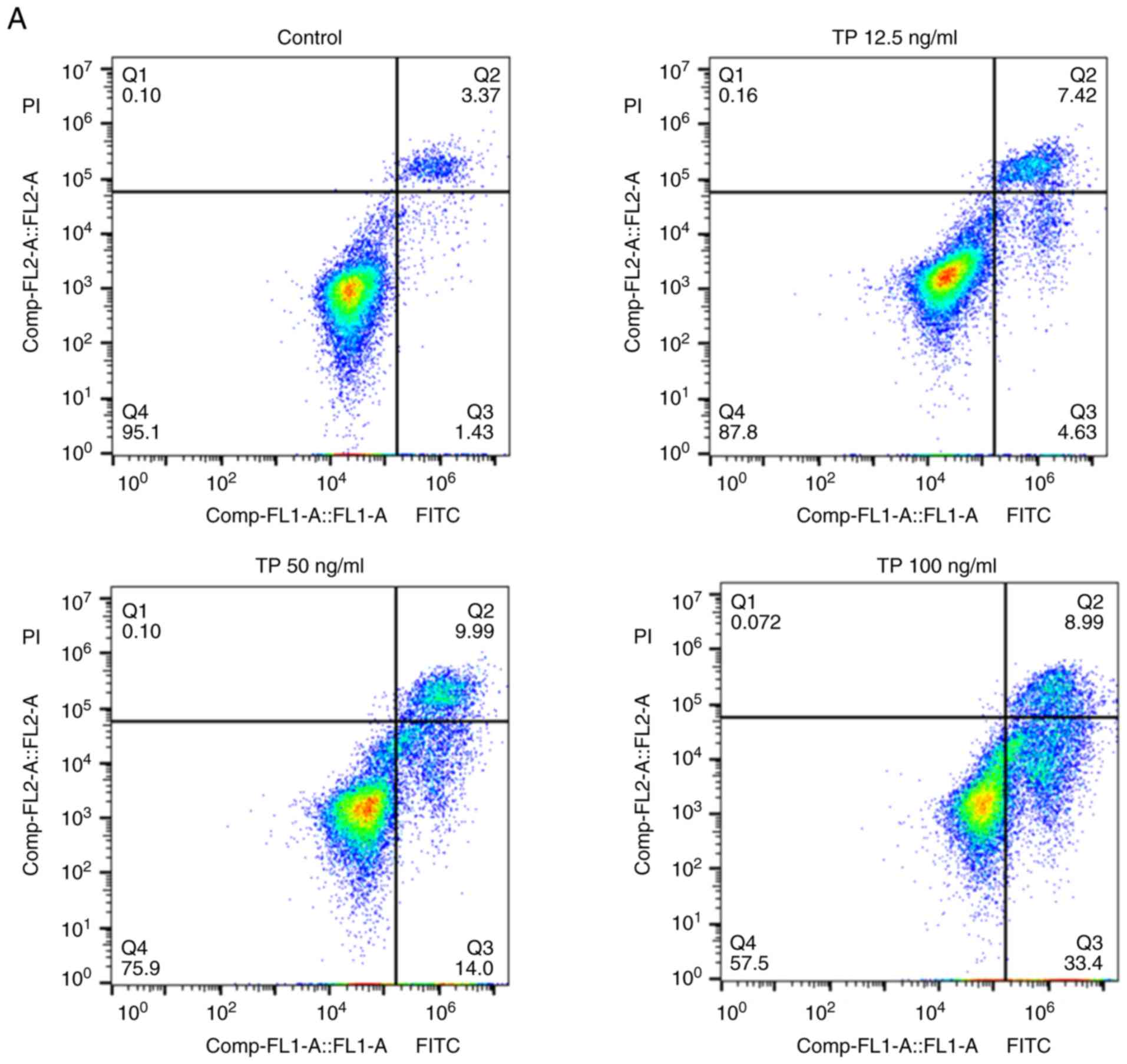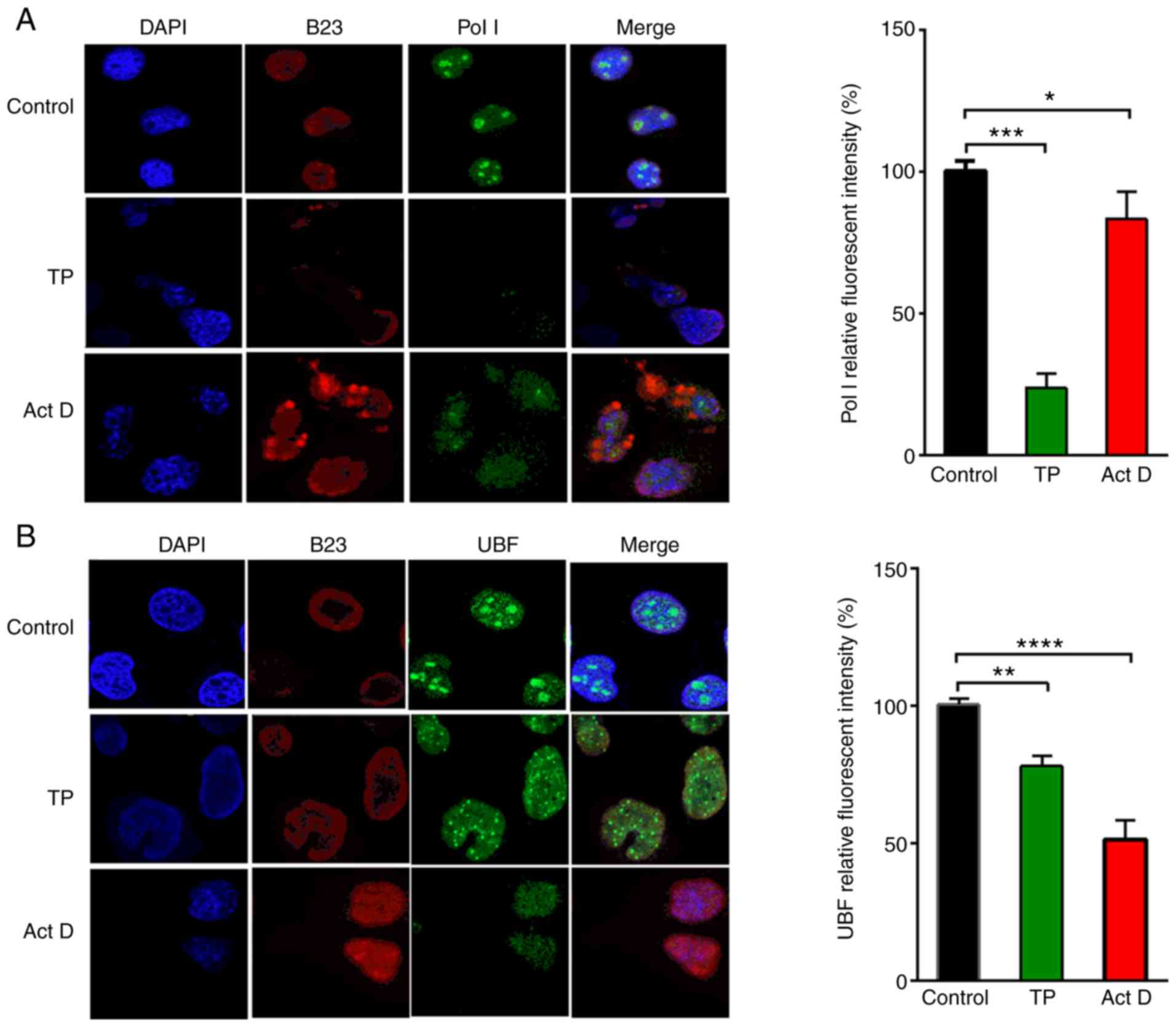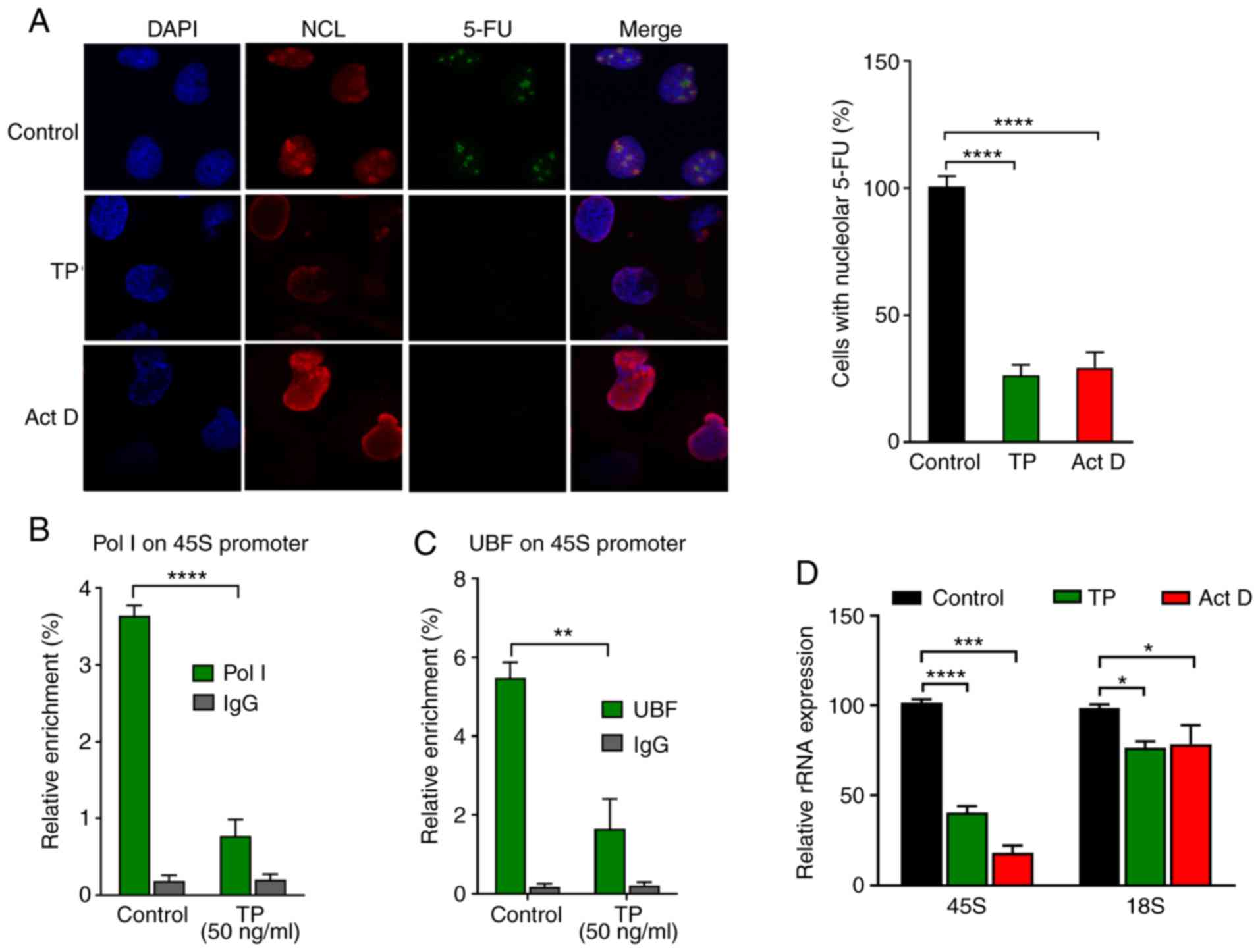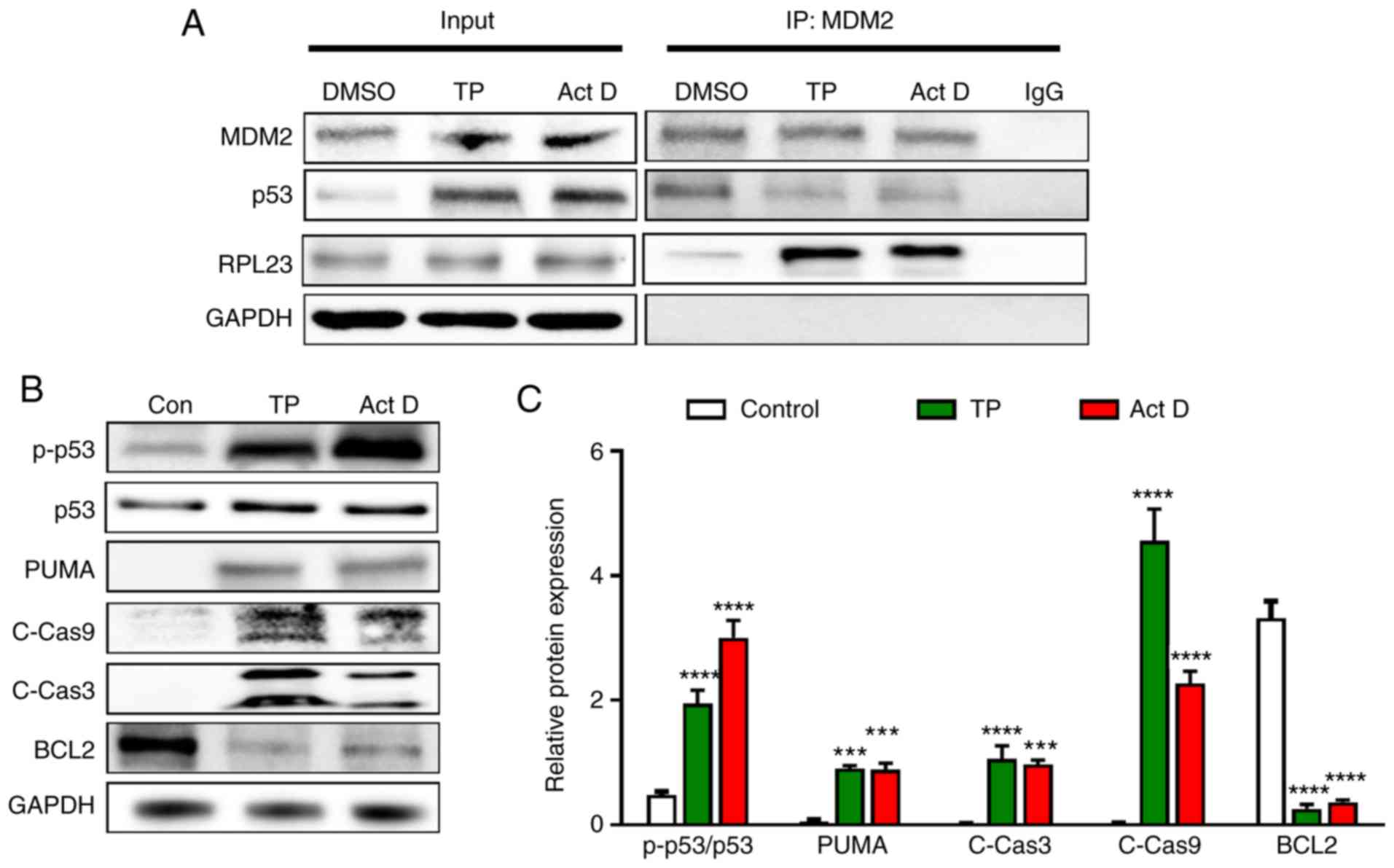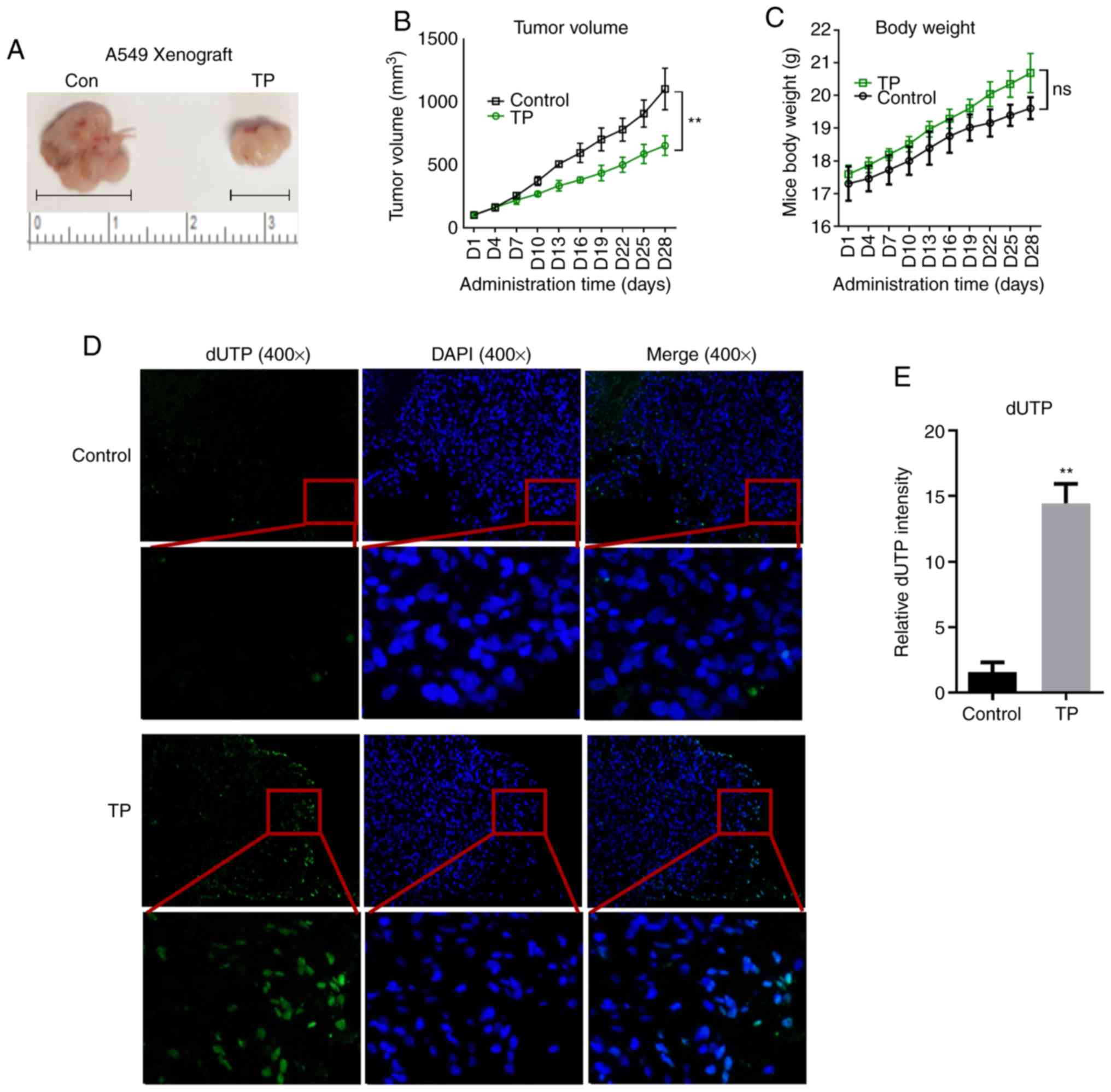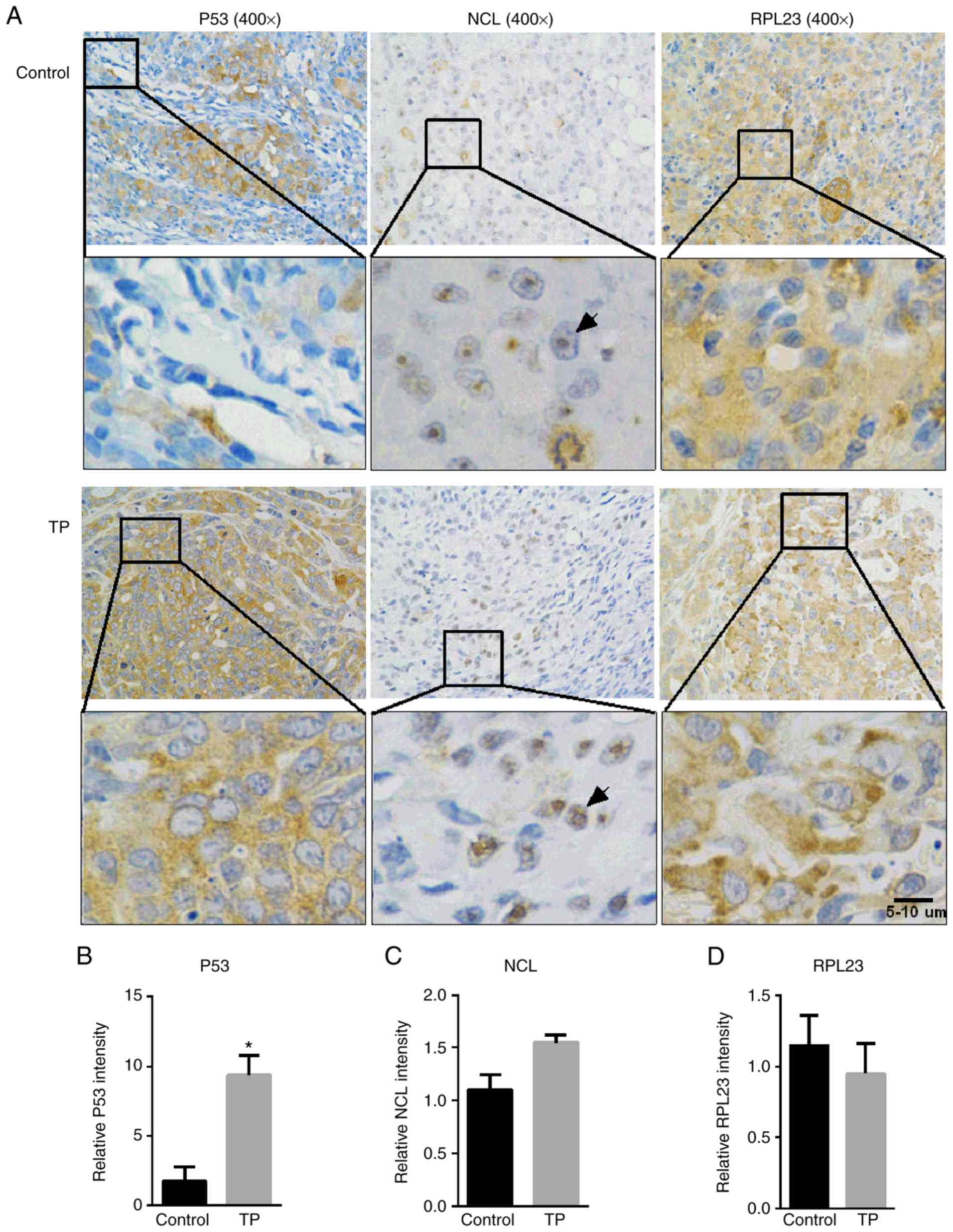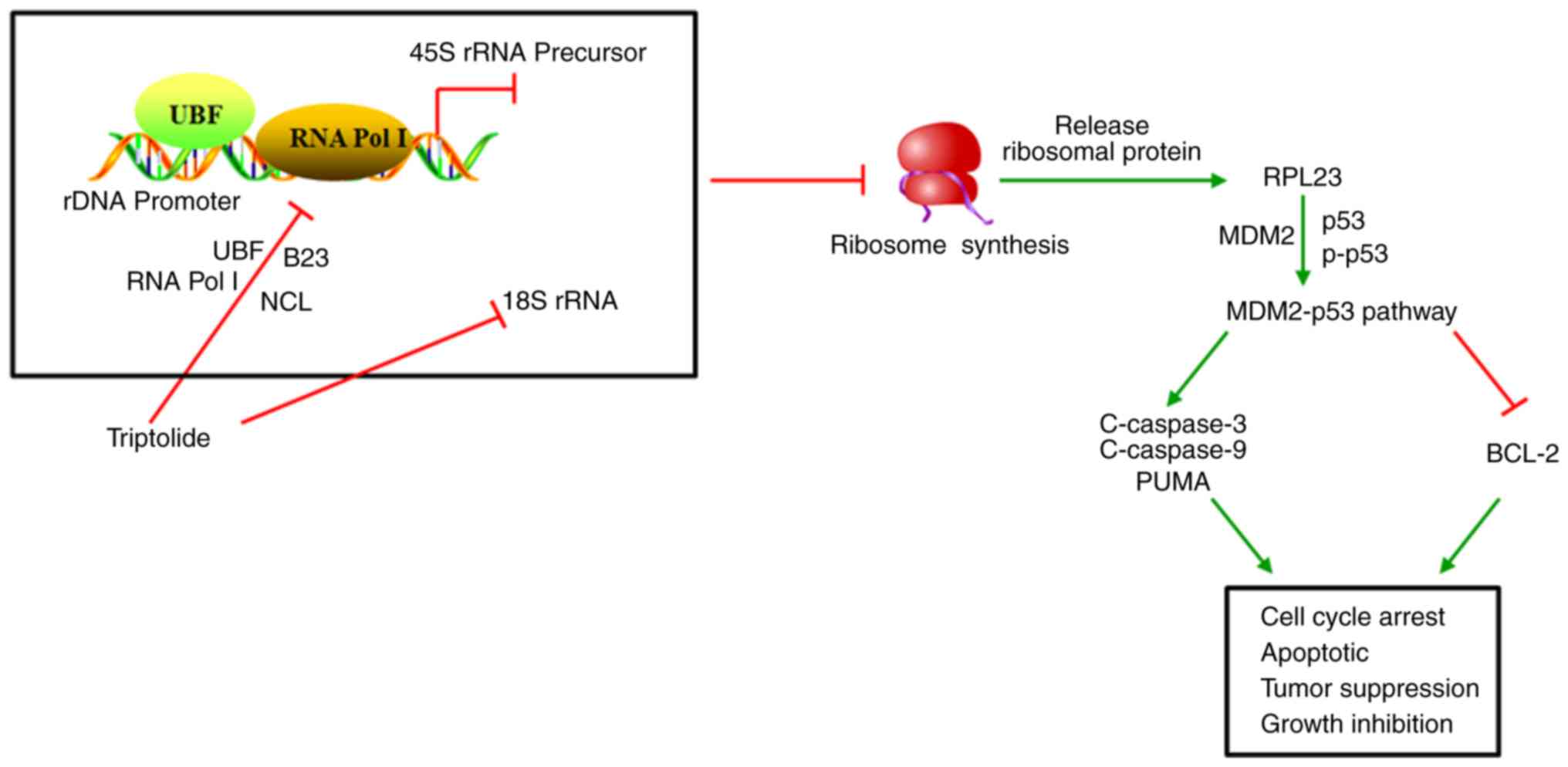|
1
|
Osmani L, Askin F, Gabrielson E and Li QK:
Current WHO guidelines and the critical role of immunohistochemical
markers in the subclassification of non-small cell lung carcinoma
(NSCLC): Moving from targeted therapy to immunotherapy. Semin
Cancer Biol. 52:103–109. 2018. View Article : Google Scholar : PubMed/NCBI
|
|
2
|
Jain NA and Otterson GA: Immunotherapy in
inoperable stage III non-small cell lung cancer: A review. Drugs
Context. 8:2125782019. View Article : Google Scholar : PubMed/NCBI
|
|
3
|
Zhang D, Jin Q, Jiang C, Gao M, Ni Y and
Zhang J: Imaging cell death: Focus on early evaluation of tumor
response to therapy. Bioconjug Chem. Mar 23–2020.(Epub ahead of
print). View Article : Google Scholar
|
|
4
|
Li-Weber M: Targeting apoptosis pathways
in cancer by Chinese medicine. Cancer Lett. 332:304–312. 2013.
View Article : Google Scholar : PubMed/NCBI
|
|
5
|
de Almeida EM, Ferreira HJ, Alves DR and
Da Silva WMB: Therapeutic potential of medicinal plants indicated
by the Brazilian public health system in treating the collateral
effects induced by chemotherapy, radiotherapy, and
chemoradiotherapy: A systematic review. Complement Ther Med.
49:1022932020. View Article : Google Scholar : PubMed/NCBI
|
|
6
|
Luo D, Zuo Z, Zhao H, Tan Y and Xiao C:
Immunoregulatory effects of Tripterygium wilfordii Hook F and its
extracts in clinical practice. Front Med. 13:556–563. 2019.
View Article : Google Scholar : PubMed/NCBI
|
|
7
|
Noel P, Von Hoff DD, Saluja AK, Velagapudi
M, Borazanci E and Han H: Triptolide and its derivatives as cancer
therapies. Trends Pharmacol Sci. 40:327–341. 2019. View Article : Google Scholar : PubMed/NCBI
|
|
8
|
Chen SR, Dai Y, Zhao J, Lin L and Wang Y
and Wang Y: A mechanistic overview of triptolide and celastrol,
natural products from tripterygium wilfordii Hook F. Front
Pharmacol. 9:1042018. View Article : Google Scholar : PubMed/NCBI
|
|
9
|
Yan P and Sun X: Triptolide: A new star
for treating human malignancies. J Cancer Res Ther. 14:S271–S275.
2018. View Article : Google Scholar : PubMed/NCBI
|
|
10
|
Meng G, Wang W, Chai K, Yang S, Li F and
Jiang K: Combination treatment with triptolide and
hydroxycamptothecin synergistically enhances apoptosis in A549 lung
adenocarcinoma cells through PP2A-regulated ERK, p38 MAPKs and Akt
signaling pathways. Int J Oncol. 46:1007–1017. 2015. View Article : Google Scholar : PubMed/NCBI
|
|
11
|
Li F, Zhao D, Yang S, Wang J, Liu Q, Jin X
and Wang W: ITRAQ-based proteomics analysis of triptolide on human
A549 lung adenocarcinoma cells. Cell Physiol Biochem. 45:917–934.
2018. View Article : Google Scholar : PubMed/NCBI
|
|
12
|
Goodfellow SJ and Zomerdijk JC: Basic
mechanisms in RNA polymerase I transcription of the ribosomal RNA
genes. Subcell Biochem. 61:211–236. 2013. View Article : Google Scholar : PubMed/NCBI
|
|
13
|
Wang M and Pestov DG: Quantitative
northern blot analysis of mammalian rRNA processing. Methods Mol
Biol. 1455:147–157. 2016. View Article : Google Scholar : PubMed/NCBI
|
|
14
|
Russell J and Zomerdijk JC: The RNA
polymerase I transcription machinery. Biochem Soc Symp. 73:203–216.
2006. View Article : Google Scholar
|
|
15
|
O'Sullivan AC, Sullivan GJ and McStay B:
UBF binding in vivo is not restricted to regulatory sequences
within the vertebrate ribosomal DNA repeat. Mol Cell Biol.
22:657–668. 2002. View Article : Google Scholar : PubMed/NCBI
|
|
16
|
Wang HT, Chen TY, Weng CW, Yang CH and
Tang MS: Acrolein preferentially damages nucleolus eliciting
ribosomal stress and apoptosis in human cancer cells. Oncotarget.
7:80450–80464. 2016.PubMed/NCBI
|
|
17
|
Vispé S, DeVries L, Créancier L, Besse J,
Bréand S, Hobson DJ, Svejstrup JQ, Annereau JP, Cussac D, Dumontet
C, et al: Triptolide is an inhibitor of RNA polymerase I and
II-dependent transcription leading predominantly to down-regulation
of short-lived mRNA. Mol Cancer Ther. 8:2780–2790. 2009. View Article : Google Scholar : PubMed/NCBI
|
|
18
|
Livak KJ and Schmittgen TD: Analysis of
relative gene expression data using real-time quantitative PCR and
the 2(-Delta Delta C(T)) method. Methods. 25:402–408. 2001.
View Article : Google Scholar : PubMed/NCBI
|
|
19
|
Boulon S, Westman BJ, Hutten S, Boisvert
FM and Lamond AI: The nucleolus under stress. Mol Cell. 40:216–227.
2010. View Article : Google Scholar : PubMed/NCBI
|
|
20
|
Mitrea DM, Cika JA, Guy CS, Ban D,
Banerjee PR, Stanley CB, Nourse A, Deniz AA and Kriwacki RW:
Nucleophosmin integrates within the nucleolus via multi-modal
interactions with proteins displaying R-rich linear motifs and
rRNA. Elife. 5:e135712016. View Article : Google Scholar : PubMed/NCBI
|
|
21
|
Burger K, Mühl B, Harasim T, Rohrmoser M,
Malamoussi A, Orban M, Kellner M, Gruber-Eber A, Kremmer E, Hölzel
M and Eick D: Chemotherapeutic drugs inhibit ribosome biogenesis at
various levels. J Biol Chem. 285:12416–12425. 2010. View Article : Google Scholar : PubMed/NCBI
|
|
22
|
Turi Z, Lacey M, Mistrik M and Moudry P:
Impaired ribosome biogenesis: Mechanisms and relevance to cancer
and aging. Aging (Albany NY). 11:2512–2540. 2019. View Article : Google Scholar : PubMed/NCBI
|
|
23
|
Dai MS, Zeng SX, Jin Y, Sun XX, David L
and Lu H: Ribosomal protein L23 activates p53 by inhibiting MDM2
function in response to ribosomal perturbation but not to
translation inhibition. Mol Cell Biol. 24:7654–7668. 2004.
View Article : Google Scholar : PubMed/NCBI
|
|
24
|
Chen J: The cell-cycle arrest and
apoptotic functions of p53 in tumor initiation and progression.
Cold Spring Harb Perspect Med. 6:a0261042016. View Article : Google Scholar : PubMed/NCBI
|
|
25
|
Deregowska A, Adamczyk J, Kwiatkowska A,
Gurgul A, Skoneczny M, Skoneczna A, Szmatola T, Jasielczuk I, Magda
M, Rawska E, et al: Shifts in rDNA levels act as a genome buffer
promoting chromosome homeostasis. Cell Cycle. 14:3475–3487. 2015.
View Article : Google Scholar : PubMed/NCBI
|
|
26
|
Wang W, Luo J, Xiang F, Liu X, Jiang M,
Liao L and Hu J: Nucleolin down-regulation is involved in
ADP-induced cell cycle arrest in S phase and cell apoptosis in
vascular endothelial cells. PLoS One. 9:e1101012014. View Article : Google Scholar : PubMed/NCBI
|
|
27
|
Phi JH, Sun CH, Lee SH, Lee S, Park I,
Choi SA, Park SH, Lee JY, Wang KC, Kim SK, et al: NPM1 as a
potential therapeutic target for atypical teratoid/rhabdoid tumors.
BMC Cancer. 19:8482019. View Article : Google Scholar : PubMed/NCBI
|
|
28
|
Okur MN, Lee JH, Osmani W, Kimura R,
Demarest TG, Croteau DL and Bohr VA: Cockayne syndrome group A and
B proteins function in rRNA transcription through nucleolin
regulation. Nucleic Acids Res. 48:2473–2485. 2020. View Article : Google Scholar : PubMed/NCBI
|
|
29
|
Murano K, Okuwaki M, Hisaoka M and Nagata
K: Transcription regulation of the rRNA gene by a multifunctional
nucleolar protein, B23/nucleophosmin, through its histone chaperone
activity. Mol Cell Biol. 28:3114–3126. 2008. View Article : Google Scholar : PubMed/NCBI
|
|
30
|
Engel C, Gubbey T, Neyer S, Sainsbury S,
Oberthuer C, Baejen C, Bernecky C and Cramer P: Structural basis of
RNA polymerase I transcription initiation. Cell. 169:120–131.e22.
2017. View Article : Google Scholar : PubMed/NCBI
|
|
31
|
Lin YM, Chu PH and Ouyang P: Ectopically
expressed pNO40 suppresses ribosomal RNA synthesis by inhibiting
UBF-dependent transcription activation. Biochem Biophys Res Commun.
516:381–387. 2019. View Article : Google Scholar : PubMed/NCBI
|
|
32
|
Sugiyama T, Li S, Kato M, Ikeuchi K,
Ichimura A, Matsuo Y and Inada T: Sequential ubiquitination of
ribosomal protein uS3 triggers the degradation of non-functional
18S rRNA. Cell Rep. 26:3400–3415.e7. 2019. View Article : Google Scholar : PubMed/NCBI
|
|
33
|
Zhang Y and Lu H: Signaling to p53:
Ribosomal proteins find their way. Cancer Cell. 16:369–377. 2009.
View Article : Google Scholar : PubMed/NCBI
|
|
34
|
Li XQ, Yu Q, Chen FS, Tan WF, Zhang ZL and
Ma H: Inhibiting aberrant p53-PUMA feedback loop activation
attenuates ischaemia reperfusion-induced neuroapoptosis and
neuroinflammation in rats by downregulating caspase 3 and the NF-κB
cytokine pathway. J Neuroinflammation. 15:2502018. View Article : Google Scholar : PubMed/NCBI
|
|
35
|
Garufi A, Pistritto G, Baldari S, Toietta
G, Cirone M and D'Orazi G: p53-Dependent PUMA to DRAM antagonistic
interplay as a key molecular switch in cell-fate decision in
normal/high glucose conditions. J Exp Clin Cancer Res. 36:1262017.
View Article : Google Scholar : PubMed/NCBI
|
|
36
|
Chen D, Ni HM, Wang L, Ma X, Yu J, Ding WX
and Zhang L: p53 up-regulated modulator of apoptosis induction
mediates acetaminophen-induced necrosis and liver injury in mice.
Hepatology. 69:2164–2179. 2019. View Article : Google Scholar : PubMed/NCBI
|
|
37
|
Lessard F, Igelmann S, Trahan C, Huot G,
Saint-Germain E, Mignacca L, Del Toro N, Lopes-Paciencia S, Le
Calvé B, Montero M, et al: Senescence-associated ribosome
biogenesis defects contributes to cell cycle arrest through the Rb
pathway. Nat Cell Biol. 20:789–799. 2018. View Article : Google Scholar : PubMed/NCBI
|
|
38
|
Del Toro N, Fernandez-Ruiz A, Mignacca L,
Kalegari P, Rowell MC, Igelmann S, Saint-Germain E, Benfdil M,
Lopes-Paciencia S, Brakier-Gingras L, et al: Ribosomal protein
RPL22eL22 regulates the cell cycle by acting as an inhibitor of the
CDK4-cyclin D complex. Cell Cycle. 18:759–770. 2019. View Article : Google Scholar : PubMed/NCBI
|
|
39
|
Heissenberger C, Liendl L, Nagelreiter F,
Gonskikh Y, Yang G, Stelzer EM, Krammer TL, Micutkova L, Vogt S,
Kreil DP, et al: Loss of the ribosomal RNA methyltransferase NSUN5
impairs global protein synthesis and normal growth. Nucleic Acids
Res. 47:11807–11825. 2019. View Article : Google Scholar : PubMed/NCBI
|
|
40
|
Liu X, Tan Y, Zhang C, Zhang Y, Zhang L,
Ren P, Deng H, Luo J, Ke Y and Du X: NAT10 regulates p53 activation
through acetylating p53 at K120 and ubiquitinating Mdm2. EMBO Rep.
17:349–366. 2016. View Article : Google Scholar : PubMed/NCBI
|
|
41
|
Xing Y, Liu Y, Liu T, Meng Q, Lu H, Liu W,
Hu J, Li C, Cao M, Yan S, et al: TNFAIP8 promotes the proliferation
and cisplatin chemoresistance of non-small cell lung cancer through
MDM2p53 pathway. Cell Commun Signal. 16:432018. View Article : Google Scholar : PubMed/NCBI
|
|
42
|
Zhou Q, Hou Z, Zuo S, Zhou X, Feng Y, Sun
Y and Yuan X: LUCAT1 promotes colorectal cancer tumorigenesis by
targeting the ribosomal protein L40-MDM2-p53 pathway through
binding with UBA52. Cancer Sci. 110:1194–1207. 2019. View Article : Google Scholar : PubMed/NCBI
|
|
43
|
Lempiäinen H and Shore D: Growth control
and ribosome biogenesis. Curr Opin Cell Biol. 21:855–863. 2009.
View Article : Google Scholar : PubMed/NCBI
|















